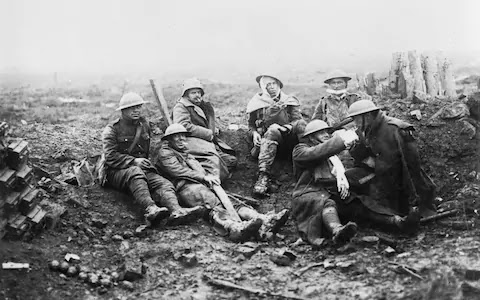This week marks the
100th anniversary of the end of the battle of Passchendaele (3rd
Ypres). Ostensibly, the objective of the battle was to reach the Belgium coast. But it soon became apparent to British generals that this objective was beyond reach. From then on the battle would become one of attrition.
For the British: A terrible and largely pointless battle that achieved little, apart
from killing Germans. A relentlessly grim conflict that defines the concept of
attrition; fighting for the sole purpose of killing enemy soldiers and hoping
that your losses do not outstrip theirs. Is there anything more terrible than
the doctrine of attrition? Seeing men as mere counters to be erased from the
board. Predictably, the generals who devised such a strategy were divorced from
the terrors and tragedy of battle.
To mark this anniversary
I’ve decided to rehash an old post.
Read and weep
The Third Battle of Ypres in the summer of 1917 (Passchendaele), together with the battle of the Somme is synonymous, at least in British eyes, with the futility and mass slaughter of the First World War, and in my opinion, rightly so.
General Haig, the commander of the British forces had formed a picture in his mind. He envisioned a German army close to defeat, battered by the Somme offensive of the preceding summer. One last push to the Belgium Flanders as the field of operation. On the map Flanders seemed the ideal place for a major British offensive. A gain of just 30 miles would take the British to the Belgium ports of Ostend
Lloyd George, the British Prime Minister, was against the offensive from the first and predicted another 'slaughter fest' without any tangible result. Haig was adamant that Ostend Germany
The French allies did not support an offensive here, nor did any of the other British Generals. As one French General so presciently (not a real word) stated: "You can't fight both Boche and boue" (Germans and mud). In fact it was the French army that was close to collapse. The German attack on Verdun
As predicted, the battlefield became a morass fuelled by summer and autumn rains. All that was needed was the ever present artillery fire to plough and churn the land into a mud/blood bath. Furthermore, in the north the Belgians had destroyed the dykes thus letting in the sea. On this flank the Germans were secure. They had also built strong defences in depth in front of the British trenches. The high water table in the area ensured that the forth coming battle would turn into a duck-walk rather than Haig's imaginary cake-walk.
The offensive was heralded by the obligatory drum fire of artillery extended over several days. The battle began on the 31st July 1917. By the end of the first day it was clear to the British High Command that the offensive had failed. With advances of no more than half a mile the main German line was nowhere breached. Men, tanks and artillery simply sank and disappeared in the deep cloying mud. With no breakthrough in sight, Haig changed his objectives. No longer would the offensive result in the capture of Ostend
And so for the butcher’s bill: British casualties- 300,000; German casualties- 200,000. Haig argued that the Germans had suffered severely and planned a further offensive in the spring of 1918 which would bring the Germans to their knees. Again Haig was wrong. The Germans had more than enough men left to launch their own formidable spring offensive of 1918.
The effect on the British army was more subtle. As one British army Sergeant sensibly put it: “We will beat them but not before they break our hearts”. If innocence had been lost on the Somme , so enthusiasm had been lost at Passchendaele. It was replaced by grim determination and a stark professionalism to get the job done, but at what cost?



This week I shall travel in a coach full of Brits, well Norfolkers, from Calais to Adinkerke to buy tobacco and help keep the Belgium Health Care system rosy. Almost certain (I'd have to dig out their letters) that Great Granddad Dwarf and London-Granddad Dwarf both marched roughly the same route. Assuming the temazepam wears off in time I shall spare a thought for both them, especially Great Granddad (what stood on a soap box to join up) who fought at the Somme and all the other bloody awful battles in the region.
ReplyDeleteA Brit, whose German wife will be at home in England, well Norfolk, travelling down a road past the battle sites to Belgium ...I shall mentally give thanks for their sacrifices and give thanks for the EU.
Hi BD, I’m arranging a trip with my son in the near future to visit ‘Flanders Field’ to explore old battle fields and pay our respects to the fallen. Both my grandparents fought in the Great War. My maternal granddad was a regular and fought at Mons where he was taken prisoner. My paternal granddad was part of Kitchener’s volunteer army and took part in the Somme and Ypres offensive.
DeleteI read your post Flaxen and I did weep. My great grandfather died in the mud with the Gloucesters at Poelcappelle during the the Third Ypres. A little over twenty years later his son, with the Royal Warwicks, fought Leibstandarte SS Adolf Hitler at Wormhout, only 40km west of where his father died. Thankfully he wasn't captured and made it to the beaches at Dunkirk. My father had more sense and avoided foreign wars -- me unfortunately not so much. I wish you and your son a good trip to the battlefields.
ReplyDeleteTeeth chatter
Feet freeze
With winter ahead
On count-down to Reveille
And the beginning of spring
While sheathed swords
Honour the glorious dead.
Last Post by Paul du Plessis
2009.
It seems the sacrifice of our recent ancestors has been mostly forgotten by the young according to a post by our good friend, Dioclese.
Delete